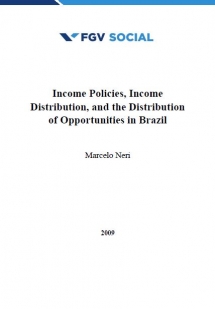
Income Policies, Income Distribution, and the Distribution of Opportunities in Brazil (in English) - Neri, Marcelo Cortes
Sobre o paper:
ABSTRACT
Brazilian inequality has been stable with a Gini of per capita income around 0.6 between 1970 and 2000. In the recent 2001-2006 period, however, inequality has been in decline. The fall of inequality observed in this five-year period is comparable to the famous rise observed in the 1960s (roughly 70% of the change in the Gini). As a result Brazil presents falling poverty rates despite meager growth until 2004. Brazil already reached the first Millennium Development Goal of reducing extreme poverty to half of its initial value in approximately half of the time required. According to household survey-based estimates, since 2005 average growth has been higher: 8% per year on per capita incomes. Brazil average performance became comparable to the others BRICs but just in this recent period, replicating the growth rates observed during its economic miracle. Although, the poor have been experiencing Chinese growth rates since 2001.
This paper analyses the role played by income policies on income distribution in Brazil, discussing some of its political economy determinants, its short-run impacts and its potential long-run effects through the distribution of opportunities. This paper summarizes my previous work on the determinants of the recent trends and cycles of income based on Brazilian social indicators. It shows the existence of electoral cycles behind the expansion of official monetary transfers. The paper also evaluates the targeting efficiency of the main income policies through the fiscal costs to short-run social welfare benefits ratio.
The paper maps the impact of income policies on a series of state variables that allows envisaging how permanent could be the effects of compensatory policies in Brazil. It evaluates the impacts of these income policies using a difference-in-difference approach between income strata. We take advantage of the recent expansion of these benefits between 2004 and 2006 and the special supplement on social programs of the Brazilian National Survey (PNAD) that were collected in these two years. We use this as an experiment to test how this expansion affected the distribution of opportunity-related social indicators such as work decisions, fertility, child mortality, education, migration, physical assets accumulation, and access to credit. In the light of this evidence we discuss desirable upgrades of Brazilian income policies such as changes in targeting strategies, new conditionalities, possible links with the supply of financial instruments and the use of social targets to isolate policies adopted from the electoral cycle.
REFERÊNCIAS
Este paper foi publicado em:
Livro
NERI, Marcelo C. Income Policies, Income Distribution, and the Distribution of Opportunities in Brazil. In: BRAINARD, Lael; MARTINEZ-DIAZ, Leonardo. Brazil as an Economic Superpower? Understanding Brazil's Changing Role in the Global Economy. Washington, D.C.: The Brookings Institution, 2009. p.221-269.
Trabalhos Apresentados
NERI, Marcelo C. Income Policies, Income Distribution, and the Distribution of Opportunities in Brazil. In: LACEA-LAMES, 13., 2008. Rio de Janeiro.
NERI, Marcelo C. Income Policies, Income Distribution, and the Distribution of Opportunities in Brazil. In: Brookings Global Economy and Development, 2008. Washington, D.C.
NERI, Marcelo C. Income Policies, Income Distribution, and the Distribution of Opportunities in Brazil. In: CONGRESSO BIEN, 13., 2010. São Paulo.
Site
NERI, Marcelo C. Income Policies, Income Distribution, and the Distribution of Opportunities in Brazil. 2008. FGV EPGE-Ensaios Econômicos, n.678. Disponível em:<http://bibliotecadigital.fgv.br/dspace/handle/10438/1717>
NERI, Marcelo C. Income Policies, Income Distribution, and the Distribution of Opportunities in Brazil. 2009. FGV Social. Disponível em: <https://cps.fgv.br/income-policies-income-distribution-and-distribution-opportunities-brazil-english>




